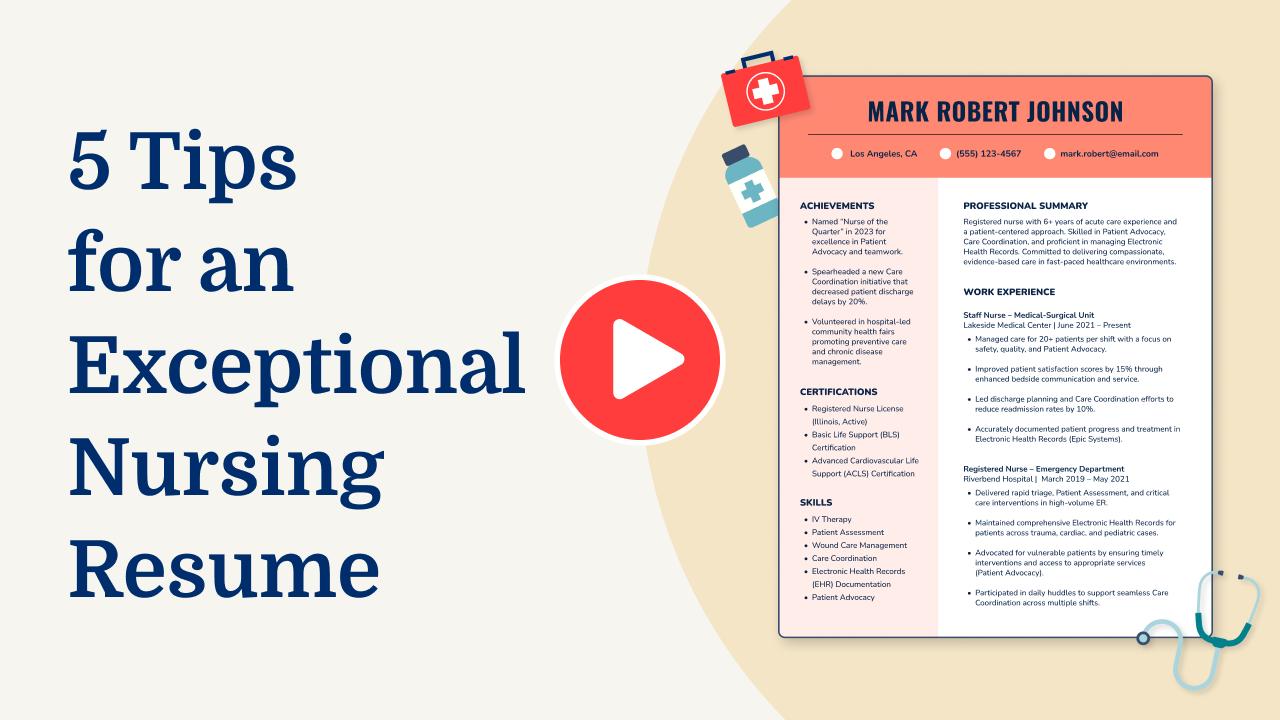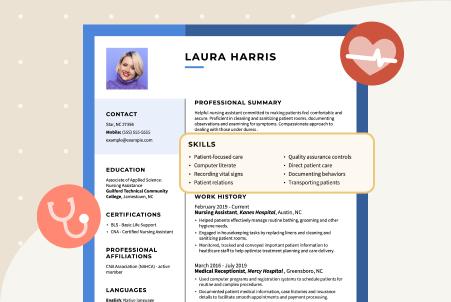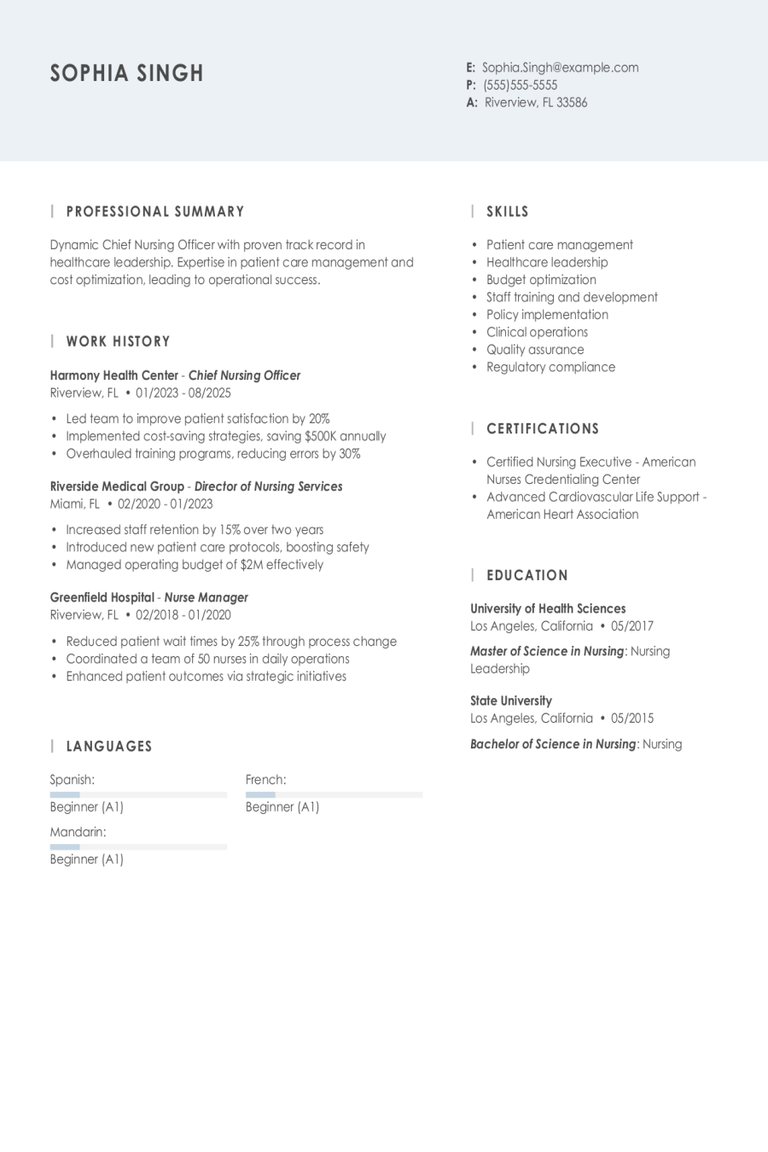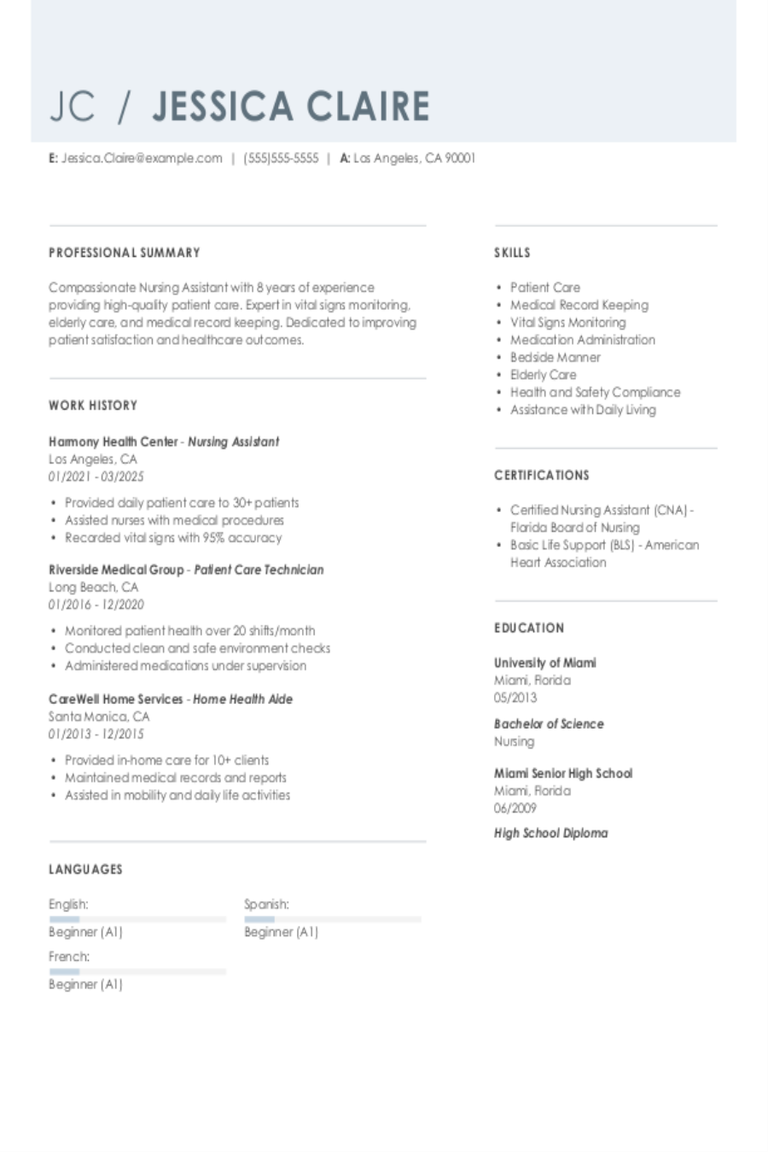Table of Contents
Get started with MyPerfectResume today!
- Build a resume on any device
- Pick an ATS-friendly template
- Tailor with AI copy suggestions
Why this resume works
- Quantifies accomplishments: By using figures like a 30% annual improvement in patient care, the applicant’s accomplishments offer a clear picture of significant contributions to healthcare efficiency.
- Uses action-oriented language: Action verbs such as “improved,” “led,” and “optimized” throughout their responsibilities exemplify how effectively the applicant uses language to convey initiative and results.
- Illustrates problem-solving ability: The applicant showcases problem-solving skills by improving recovery protocols to save $20K and reducing errors by 20%, highlighting their innovative approach.
More Nursing Resume Examples
Explore these nursing resume examples to see how to effectively showcase your clinical expertise, patient care skills, and healthcare experience. Tailor your resume following our tips to stand out in nursing.
Nurse practitioner resume
Why this resume works
- Effective use of keywords: Incorporating role-relevant keywords like “patient care management” and “chronic disease programs” ensures the resume passes ATS checks effortlessly.
- Puts skills at the forefront: Using a skills-based resume format, the layout prioritizes skills such as “healthcare workflow optimization,” showcasing a practical approach for entry-level applicants.
- Sections are well-organized: Effective use of bullet points and headers makes the resume easy to scan, ensuring key achievements are quickly accessible and improving readability.
Emergency room nurse resume
Why this resume works
- Points to measurable outcomes: By slashing patient wait times by 25% and improving care protocols, the applicant shows their impact on healthcare efficiency and effectiveness in real-world settings.
- Demonstrates language abilities: The applicant’s language skills in Spanish, French, and German boosts communication with diverse patient populations.
- Displays technical expertise: Expertise in electronic health records and certifications like certified emergency nurse showcase the technical capabilities essential for today’s fast-paced healthcare environments.
Registered nurse resume
Why this resume works
- Lists relevant certifications: The applicant’s Certified Emergency Nurse and Advanced Cardiac Life Support certifications bolster their nursing expertise and commitment to ongoing learning.
- Showcases impressive accomplishments: Reducing ER admission rates by 15% annually and improving patient satisfaction scores by 20% demonstrates impressive accomplishments with significant impact on healthcare delivery.
- Emphasizes leadership skills: By training new nurses and implementing triage systems, the applicant showcases strong leadership skills that improve patient care efficiency.
Explore Even More Nursing Resumes
Nursing Resume Template (Text Version)
David Wang
Cedar Valley, MN 55133
(555)555-5555
David.Wang@example.com
Professional Summary
Passionate Registered Nurse with 7 years in healthcare. Expert in patient care and team leadership, enhancing recovery protocols and optimizing health plans for efficient operations.
Skills
- Patient Care
- Team Leadership
- Health Assessment
- Record Keeping
- Emergency Response
- Clinical Procedures
- Adherence to Protocols
- Conflict Resolution
Certifications
- Certified Nursing Assistant – National Healthcare Association
- Basic Life Support – American Heart Association
Education
Master of Science Nursing
University of Texas Austin, Texas
May 2017
Bachelor of Science Health Sciences
Texas State University San Marcos, Texas
May 2015
Work History
Registered Nurse
Harmony Health Center – Cedar Valley, MN
June 2023 – August 2025
- Improved patient care by 30% annually
- Led a team reducing wait times by 15%
- Enhanced recovery protocols saving $20K
Caregiver Specialist
Serenity Care Solutions – Cedar Valley, MN
April 2019 – May 2023
- Managed care schedules boosting morale
- Initiated new health plans, cutting costs 12%
- Optimized supply chain, saving $10K annually
Nursing Assistant
Meadowbrook Clinic – Minneapolis, MN
January 2018 – April 2019
- Assisted in operations, decreased errors 20%
- Developed patient engagement initiative
- Collaborated with team improving satisfaction
Languages
- Spanish – Beginner (A1)
- French – Intermediate (B1)
- Italian – Beginner (A1)
Browse Resume Examples by Industry
- Aviation
- Banking
- Billing And Collections
- Biology
- Boating
- Business Operations
- Casino
- Chemistry
- Child Care
- Civil Engineering
- Compliance
- Computer Hardware
- Computer Software
- Construction
- Copywriting
- Cosmetology
- Costco
- Culinary
- Customer Service
- Dance
- Data Systems Administration
- Deloitte
- Dentistry
- Driving
- Education
- Electrical
- Electrical Engineering
- Energy
- Engineering
- Entertainment
- Entrepreneur
- Entry Level
- Environmental
- Environmental Science
- Event Planning
- Executive
- Fashion
- Film
- Finance
- Fitness And Nutrition
- Food Service
- Freelancing
- General Laborer
- Goldman Sachs
- Government
- Graphic Design
- Healthcare Support
- Hospitality
- Human Resources
- HVAC
- Industrial Engineering
- Information Technology
- Insurance
- Interior Design
- Inventory Management
- Janitorial
- Landscaping
- Language Services
- Law
- Law Enforcement
- Library
- Logistics
- Maintenance
- Marketing
- McKinsey
- Mechanical Engineering
- Mechanics
- Media And Communication
- Medical
- Mental Health
- Meta
- Metal Work
- Military
- Mining
- Museum
- Music
- Netflix
- Non Profit
- Pharmaceutical
- Photography
- Physical Therapy
- Plumbing
- Politics
- Production
- Program Manager
- Project Manager
- Psychology
- Purchasing
- Quality Control
- Real Estate
- Religion
- Retail
- Safety And Security
- Sales
- Sciences
- Shipping
- Social Services
- Special Education
- Sports
- Statistics
- Student
- Teaching
- Team Lead
- Tesla
- Training And Development
- Transportation
- Travel
- Veterinary
- Walgreens
- Walmart
- Web Development
Advice for Writing Your Nursing Resume
Learn how to write a resume for a nursing position and discover how to highlight your skills and dedication to patient care.
Explore tailored tips that will help you stand out in your field, whether you’re just starting out or looking to advance your career.

Write a strong professional summary
A professional summary on a resume serves as an introduction to hiring managers, offering them a snapshot of your qualifications immediately. This approach helps you make a strong first impression and can be more effective than an objective statement, especially for experienced nurses who want to highlight their past achievements and skills.
Typically three to four sentences long, a professional summary focuses on your experience, key skills, and notable achievements. It’s ideal for those with substantial nursing experience as it communicates your professional identity and showcases the value you bring to potential employers. By using action-oriented language, you emphasize the impact you’ve made in previous roles.
In contrast, resume objectives are statements about career goals. These are best suited for entry-level nurses, individuals changing careers, or those with employment gaps. Objectives focus on what you aim to contribute rather than what you’ve accomplished so far.
Next, let’s review examples of both summaries and objectives tailored to various levels of experience that will guide you in crafting your own compelling narrative.
Nursing resume summary examples
Entry-level
Recent Bachelor of Science in Nursing graduate with clinical experience in diverse healthcare settings. Holds a Registered Nurse license and Basic Life Support (BLS) certification. Strong foundational skills in patient assessment, medication administration, and electronic health records management. Eager to contribute compassionate care and improve patient outcomes through evidence-based practice.
Mid-career
Skilled registered nurse with over seven years of experience in emergency and critical care environments. Adept at managing high-pressure situations, executing complex medical procedures, and mentoring junior staff. Recognized for improving patient throughput by streamlining triage processes. Committed to continuous professional development and delivering high-quality patient-centered care.
Experienced
Seasoned nursing leader with 15+ years in intensive care unit (ICU) management and advanced certifications in critical care nursing (CCRN). Proven track record of leading interdisciplinary teams to reduce ICU stay durations by implementing process improvements. Expert in developing staff training programs that foster professional growth and improve team efficiency while maintaining superior standards of patient safety.
Nursing resume objective examples
Recent graduate
Compassionate and dedicated recent nursing program graduate seeking an entry-level registered nurse position to use clinical skills and knowledge in providing quality patient care. Committed to fostering a supportive healthcare environment and continuously improving nursing practices.
Career changer
Motivated healthcare professional transitioning into nursing, with a solid background in patient care through previous roles as a medical assistant. Eager to contribute to a collaborative team while delivering empathetic, high-quality nursing support.
Entry-level applicant
Energetic and detail-oriented individual aiming for an entry-level registered nurse role to apply academic learnings and hands-on training in a hospital setting. Dedicated to advancing patient well-being through effective communication, critical thinking, and compassionate care.
Easily highlight your nursing skills and experience with our Resume Builder; it guides you through creating a professional layout that makes your resume stand out.
Include relevant certifications and training
Listing certifications and training is important for nursing jobs because they show your skills and knowledge. In technical fields like nursing, having the right credentials can make a big difference in getting hired.
A dedicated certifications section on your resume helps employers see your qualifications quickly. This section can be an enhancement alongside your education details. Commonly sought-after certifications in nursing include:
- Registered nurse (RN) license
- Basic life support (BLS) certification
- Advanced cardiovascular life support (ACLS) certification
- Pediatric advanced life support (PALS) certification
- Critical care registered nurse (CCRN) certification
These certifications are valuable as they show you have the necessary skills to succeed in nursing. They help you stand out to employers looking for well-trained nurses. Including them prominently on your resume increases your chances of landing a great job.
Example of a certifications section
Registered Nurse (RN) License
Issued by: State Board of Nursing
Advanced Cardiovascular Life Support (ACLS)
Issued by: American Heart Association
Pediatric Advanced Life Support (PALS)
Issued by: American Heart Association
Basic Life Support (BLS)
Issued by: American Heart Association
Certified Pediatric Nurse (CPN)
Issued by: Pediatric Nursing Certification Board (PNCB)
Choose a chronological resume format if you have steady work history in nursing, but opt for a functional or combination format if you’re changing careers, have employment gaps, or want to emphasize skills over job titles.
Showcase your work experience
Showcasing relevant work experience on a resume is key to standing out for a nursing role. This section helps employers see how your background aligns with the job’s responsibilities.
Organize your experience using reverse-chronological order, starting with your most recent position. Include the job title, employer name, location, and employment dates. This structure makes it easier for hiring managers to quickly find details about your career history.
Use action-oriented language to describe achievements and responsibilities in each role, focusing on measurable results whenever possible. Highlight tasks such as patient care, administering medications, monitoring vital signs, collaborating with healthcare teams, or maintaining detailed records.
For instance, rather than saying “assisted patients,” you could say “provided direct care to over 20 patients daily, ensuring timely medication administration and improved recovery rates.”
Employers want to see the impact you’ve made in previous positions. Include examples that demonstrate problem-solving skills or teamwork within fast-paced environments like hospitals or clinics.
By tailoring this section to reflect the core responsibilities of nursing, potential employers can connect your past experience to their needs swiftly and effectively. Being clear and specific about contributions in prior roles allows you to build a strong case for why you’re suited for their team.
5 nursing work history bullet point examples
- Administered medications and treatments to a daily average of 20 patients, achieving a 98% accuracy rate in medication delivery.
- Led infection control initiatives that decreased hospital-acquired infections by 30% over 12 months.
- Trained and mentored a team of 5 new nurses, improving their patient care skills and increasing overall unit efficiency by 25%.
- Implemented a new electronic health record system, reducing patient documentation time by 40% and increasing data accuracy.
- Coordinated interdepartmental collaboration for complex case management, resulting in a 15% improvement in patient discharge times.
Select a resume format that highlights your clinical skills, professional certifications, and versatility in different healthcare settings.
Match your resume with the job description
Tailoring your resume to match the job description is essential. This approach helps you stand out to employers and pass through applicant tracking systems (ATS). These systems scan resumes for specific keywords and phrases from job postings, so it’s important to customize your resume since it can make a big difference.
An ATS-friendly resume includes keywords and phrases that align your skills with those in the job posting. By matching your experience and abilities with these terms, you increase your chances of getting noticed by hiring managers.
To find keywords from job postings, look for skills, qualifications, and duties that are mentioned more than once. Use examples like “patient care,” “clinical assessments,” or “healthcare team collaboration” exactly as they appear, since ATS often rely on exact matches.
Incorporating these terms naturally into your resume can be done by rewriting descriptions. For example, instead of saying “Provide high-quality patient care,” you might write “Delivered high-quality patient care to improve overall health outcomes.”
Targeted resumes designed for ATS compatibility help ensure that your application gets seen by human eyes. This approach increases the likelihood of moving forward in the hiring process.
Check your resume with our ATS Resume Checker to find over 30 common mistakes in layout and wording. You’ll get quick tips on how to boost your resume’s score.
FAQ
Do I need to include a cover letter with my nursing resume?
Including a well-written nursing cover letter with your resume can help you stand out from other applicants and secure more interviews.
A cover letter allows you to personalize your application by sharing your specific interest in the position and facility, elaborating on relevant experience, and showcasing your patient care skills.
For example, if the hospital has a unique program, specialty, or unit (like oncology, NICU, or telemedicine initiatives), you can elaborate on your interest or experience in that area.
To generate a cover letter based on your resume or create a brand-new one with step-by-step guidance, use our Cover Letter Generator.
We also recommend referencing our library of cover letter examples for additional samples tailored to various industries and career levels.
How long should a nursing resume be?
For a nursing role, an one-page resume is often preferred, especially if you are early in your career. It allows you to highlight key skills like patient care, clinical experience, and any relevant certifications efficiently.
However, if you have extensive experience or specialized training, a two-page resume might be appropriate. Just ensure every detail directly relates to the nursing field and adds value.
Focus on clarity and relevance regardless of how long a resume should be. Explore our guide for more tailored tips suited to different stages of your nursing career.
How do you write a nursing resume with no experience?
When crafting a resume with no experience, especially for nursing, highlight your skills, education, and relevant training. These elements can effectively showcase your potential in the field. Here are strategies for an entry-level nursing resume:
- Emphasize your education: Start with your nursing degree, noting the institution, graduation date, and any honors or distinctions. Include details about your RN licensure status and certifications like BLS or ACLS.
- Leverage clinical rotations: Consider each clinical rotation as practical experience. Describe specific responsibilities and learning experiences such as patient care tasks, medication administration, or teamwork with healthcare professionals.
- Spotlight transferable skills: Highlight skills gained through other roles or volunteer work that are applicable to nursing. This can include communication abilities, empathy from volunteer caregiving roles, or organizational skills from administrative positions.
Check out resources on writing a resume with no experience to find more examples and tips from professional resume writers tailored to assist you further.
Rate this article
Nursing
Share this page
Additional Resources

Nursing Skills: Examples & Tips for Your Resume

Chief Nursing Officer Resume Examples & Templates
Discover chief nursing officer resume examples that highlight leadership and healthcare management skills. Find tips to showcase your experience in guiding nursing teams and improving patient care.Build my resumeImport existing

Best Nursing Assistant Resume Examples + Guide & Pro Tips
Explore nursing assistant resume examples and writing tips to learn how to highlight your hands-on experience and patient care skills effectively.Build my resumeImport existing resumeCustomize this templateWhy this resume worksHighlights

Monster Resume Builder Review: Features, Pros, & Cons (With Examples)
If you’re on the hunt for a simple, efficient tool to create a professional resume, you’ve likely come across the Monster resume builder. Monster is one of the most recognized
Business Owner Cover Letter Examples & Templates for 2026
Discover business owner cover letter examples to understand how to start your cover letter, emphasize your most relevant experiences, and finish on a strong note that leaves a lasting impression

Vice President Cover Letter Examples & Templates for 2026
Discover vice president cover letter examples that guide you in making a powerful first impression, showcasing essential skills, and crafting a strong conclusion to elevate your application.Build my cover letterCustomize
